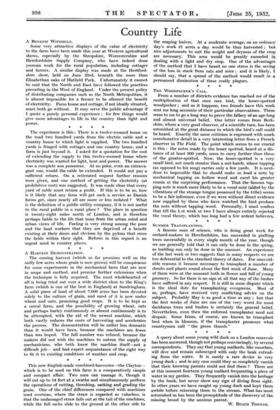The experience is this : There is a twelve-roomed house
on the road two hundred yards from the electric cable and a country house to which light is supplied. The two hundred yards is fringed with cottages and one country house, and a farm is just beyond it. I asked for a quotation for the cost of extending the supply to this twelve-roomed house where electricity was wanted for light, heat and power. The answer was a complete non possumus. At no price, even an extrava- gant one, would the cable be extended. It would not pay a sufficient return. On a reiterated request further reasons were given, and one method of getting the electricity (at prohibitive cost) was suggested, It was made clear that every yard of cable must return a profit. If this is to be so, how is it likely that any farm will get such a service as Danish farms get, since nearly all are more or less isolated ? What is the definition of a public utility company, if it is not useful to the rural public in a rural place ? The place in question is twenty-eight miles north of London, and is therefore perhaps liable to the ills that issue from the urban mind and urban views of life. Feeling is very strong among the poor and the land workers that they are deprived of a benefit existing at their doors and obvious by the pylons that cross the fields within their sight. Reform in this regard is an urgent need in country places.


































 Previous page
Previous page